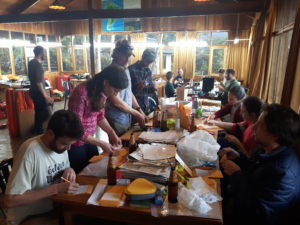I’m writing this in my Norwegian office, like nothing ever happened. But no, just a couple of weeks ago I was in beautiful Peru.
The course was a wonderful experience, a great learning experience in many ways. The course has fully met my expectations and objectives. I set out to the course without any travel experience outside Europe, and travel experience I certainly gained during the 30 hour trip from Oslo to Cusco. I have learned that it is actually possible to survive this. I loved the overly crowded markets in Cusco, and it has learned me that yes, everything is possible in Peru!

The amazing street markets in Cusco
During the course, I have met many amazing people who share my interests and do cool research. It was really good meeting people who are using their creativity to explore new horizons in trait research. I am sure I will – either in the near or distant future – collaborate with many of them. Although I have some experience with the practical work associated with trait-based research from my own work, I particularly learned a lot about the management of large field efforts and data files. Learning from the «mistakes» made in earlier courses in this series will be extremely valuable should I ever find myself in the same position (and that is quite likely). The course has also helped me decide that I will (have to) put more effort in structuring my data manipulation and analysis practices as I am now maybe a bit messy. Being messy makes collaboration and sharing of data and analytical scripts harder, so I am thankful I now have the tools (and know where to find or ask for them) to tackle this challenge. I am particularly thankful to the Peruvian students in the course, whose local knowledge, both scientifically and socially/culturally, was absolutely great.

Even the Professors join to keep the «trait circus» going
I do not think Climate Change in Peru is a controversial topic and most responses we got matched my expectations. In general, people seemed well aware of the fact that there is something like Climate Change going on, but there is massive variation in how people experience these changes and what they think the underlying mechanisms are. For example, some of the people we surveyed said it was getting colder, while the next one would say it was getting hotter. This supports my idea that personal experiences are not always a reliable source, and that they should always be considered in the light of actual data. Although not everyone we interviewed fully understood the mechanisms behind Climate Change, they all expected it as a fact, and acknowledged that it is something to care about. This contrasts with a considerable part of public opinion in the US and EU… I did expect more comments that would blame rich, western, developed, industrial countries for causing climatic problems in lesser-developed countries like Peru. But one lady was particularly convinced that Mexico was the largest contributor to Climate Change…
I think the survey is a valuable addition to the course. It is good, as a scientist, to think about public perception of scientific problems. I am looking forward to interviewing the people of Svalbard, and see if their opinions differ from Peruvians. Of course, in Peru, the language barrier was an issue. I personally do not speak (but understand some) Spanish, which made me unable to actively communicate with all. Luckily, we had (native) Spanish speakers in my group who could translate questions and answers.

Miguel interviewing in Paucartambo